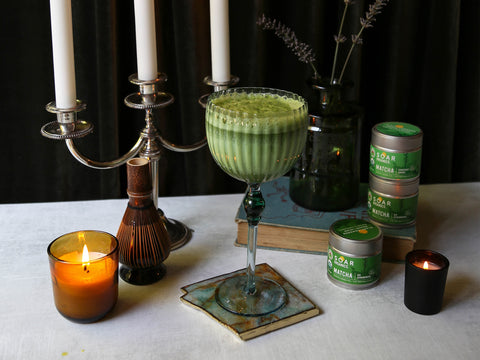Matcha, the vibrant green elixir originating from Japan, has long been cherished for its unique taste and cultural significance. However, the magic within its leaves goes beyond flavor – it's the presence of L-theanine that adds an extra layer of allure. In this journey through the world of matcha, we'll explore the profound health benefits of L-theanine, shedding light on why this amino acid makes matcha more than just a beverage but a holistic well-being experience.
What is L-Theanine?
L-theanine is a non-protein amino acid primarily found in tea leaves, particularly in higher concentrations in shade-grown matcha. This compound is unique in its ability to cross the blood-brain barrier, influencing brain activity and contributing to the distinctive effects experienced by matcha enthusiasts.
The Health Benefits of L-Theanine in Matcha
-
Stress Reduction:
L-theanine promotes the production of calming neurotransmitters, including serotonin and gamma-aminobutyric acid (GABA), leading to a state of relaxation without inducing drowsiness. This can influence reduced stress and anxiety levels.
-
Enhanced Cognitive Function:
L-theanine's interaction with caffeine in matcha creates a synergistic effect, promoting improved cognitive function and sustained focus without the jitteriness often associated with caffeine alone.
-
Quality Sleep:
L-theanine's calming properties extend to promoting better sleep quality by reducing anxiety and promoting a calm state of mind. The combination of L-theanine and matcha's other components creates a tranquil state conducive to restful sleep.
-
Immune System Support:
Some research suggests that L-theanine may activate components of the immune system, potentially strengthening the body's defense mechanisms. A bolstered immune response can increase resistance to infections.
-
Blood Pressure Regulation:
L-theanine may contribute to blood pressure regulation by promoting relaxation and vasodilation (widening of blood vessels). This relaxation effect may help reduce stress-related increases in blood pressure, promoting cardiovascular health.
Frequently Asked Questions
How much L-theanine is in matcha?
The exact content of L-theanine in matcha can vary depending on the grade and quality of the powder. 1 gram of matcha powder contains 10-20 milligrams of L-theanine on average. A typical serving size is 1.5-2 grams of matcha powder which works out to 15-40 milligrams of L-theanine per cup of matcha.
How does L-theanine in matcha differ from caffeine in coffee?
While both L-theanine and caffeine contribute to increased alertness, L-theanine in matcha provides a more balanced and sustained energy without the jitteriness often associated with coffee.
Is there a recommended daily intake of L-theanine through matcha?
There is no specific recommended daily intake, as individual responses to L-theanine may vary. Enjoying matcha as part of a balanced diet is a delightful way to incorporate L-theanine into your routine.
What does L-theanine in matcha taste like?
L-theanine in matcha contributes to its unique umami flavor, imparting a smooth and savory taste. It balances the brew's bitterness, resulting in a harmonious and calming palate experience.
Conclusion: Elevating Your Well-Being with Every Sip
As you embark on your journey with matcha, let the presence of L-theanine weave its magic into your daily life. Beyond the rich flavor and cultural significance, matcha becomes a holistic experience – a cup filled not just with tea but with tranquility, focus, and well-being.
Sources:
- Juneja, L. R., et al. (1999). "L-theanine—a unique amino acid of green tea and its relaxation effect in humans" https://pubmed.ncbi.nlm.nih.gov/16930802/
- Haskell, C. F., et al. (2008). "The effects of L-theanine, caffeine and their combination on cognition and mood" https://pubmed.ncbi.nlm.nih.gov/18006208/
- Kimura, K., et al. (2007). "L-Theanine reduces psychological and physiological stress responses" https://pubmed.ncbi.nlm.nih.gov/16930802/



